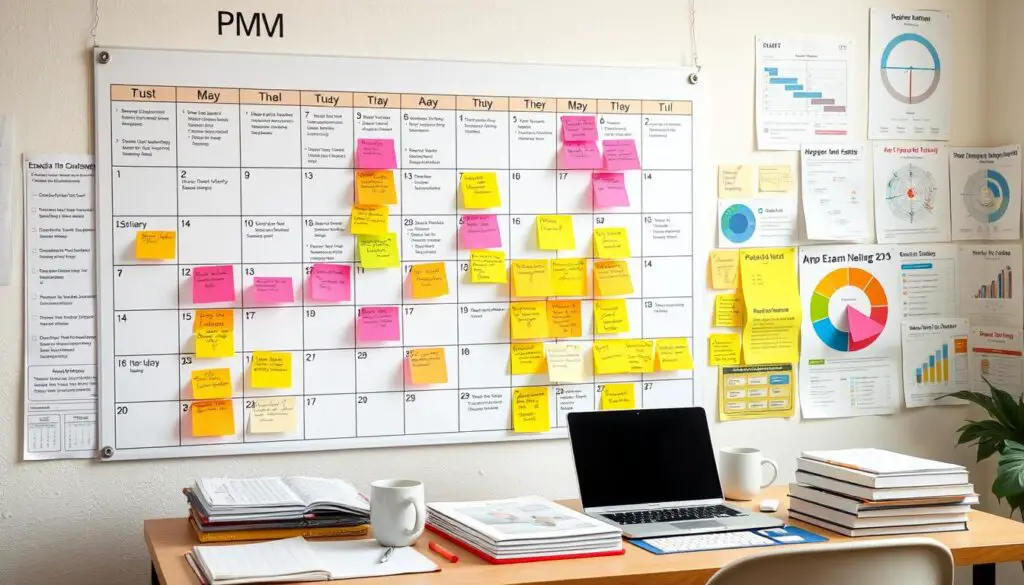Creating a good PMP study plan is key to getting your Project Management Professional certification. This certification shows you know a lot about managing projects. It’s important to plan your study well.
A good plan helps you pass the exam, which has 180 questions. These questions cover topics like People, Process, and Business Environment.
This guide will help you prepare for the PMP exam. You’ll learn how to understand what you need, find your learning style, and make a study schedule. Using the right study strategies and resources will help you prepare well.
Joining study groups and doing practice exams also helps. They make sure you remember important information.
It’s important to have a study plan that fits your schedule and how you learn. With about 30 days of study, you can do well on the PMP exam. Let’s look at the key steps to make a strong PMP study plan.
Understand the PMP Certification Requirements
Before starting your PMP certification journey, it’s important to know the exam’s eligibility rules. The Project Management Institute (PMI) sets these rules. They make sure you’re ready for the tough exam.
To get the PMP certification, you have two main paths. These paths depend on your education level:
- High School Diploma: You need 60 months of project leadership experience in the last eight years. You also need 35 hours of project management courses or a CAPM® certification.
- Four-Year College/University Degree: With a degree, you need 36 months of project leadership experience in the last eight years. The education or CAPM® certification rules are the same as for a high school diploma.
The PMI reviews your application in 5 to 10 days. Some applications might be picked for a random audit. This can slow down the process.
It’s key to meet these PMP exam eligibility rules for a smooth application. Once you’ve met these requirements, you can start planning your study strategy. This plan should fit your experience and qualifications.
| Requirement | High School Diploma | Four-Year Degree |
|---|---|---|
| Experience Hours | 60 months leading projects | 36 months leading projects |
| Project Management Education | 35 hours or CAPM® | 35 hours or CAPM® |
| Application Review Duration | 5 to 10 days | |
| Audit Selection | Some applications are selected | |
Assess Your Learning Style and Preferences
Knowing your learning style is key to a good study plan for the PMP exam. A detailed learning style assessment shows if you’re a visual, auditory, or kinesthetic learner. Each style affects how you take in information, shaping your study methods.
Visual learners do well with diagrams and charts. Using tools like flowcharts and mind maps can help them remember better. Auditory learners get more from listening and talking. They might find audio resources or study groups helpful. Kinesthetic learners learn by doing, so they benefit from interactive tools and simulations.
Matching your study methods to your learning style can greatly improve your understanding. Here’s a brief look at the main learning styles:
| Learning Style | Preferred Study Methods | Key Resources |
|---|---|---|
| Visual | Charts, diagrams, videos | Slides, infographics, flashcards |
| Auditory | Listening, discussing, lecturing | Podcasts, audio recordings, study groups |
| Kinesthetic | Interactive practice, simulations | Workshops, hands-on activities, role-playing |
Spending time on learning style assessments can make your study plan more effective. By figuring out what works for you, you can create a study plan that fits. Getting ready for the PMP exam needs a good plan that matches your learning style.
Create a Comprehensive Study Schedule
Creating a detailed study plan for the PMP exam can greatly improve your chances of passing. A good plan breaks down the syllabus into weekly parts. This makes it easier to stay focused and cover all topics.
It ensures your study pace matches your understanding. This makes studying more effective.
Break Down the Study Schedule by Week
Your study plan for the PMP exam should last 3-4 months. This gives you enough time to review and practice well. Try to study about 6 hours a week to cover all important areas.
Each week, focus on specific topics from the PMBOK Guide. Start with the basics in the first month. Then, dive deeper into complex topics like risk and cost management.
Include Specific Milestones and Goals
Adding milestones and goals to your schedule helps track your progress. Try to score over 70% in practice quizzes to check your readiness. Using daily study habits and regular reviews helps you remember better.
Joining a study group or a local PMI chapter is also helpful. It offers networking chances, improves learning through discussions, and keeps you accountable with your peers.

Select the Right Study Materials and Resources
Choosing the right study materials is key to acing the PMP exam. Good preparation means not just reading important texts. It also means using different resources to help you understand and remember better. Quality PMP study resources, including PMI-approved materials, are very important. They show you the latest in project management.
Utilize PMI-Approved Materials
Knowing PMI-approved materials, like the PMBOK® Guide, is essential. Studies show that about 90% of those who pass the exam do so because they know this guide well. As you study, make sure to use project management textbooks from well-known authors. These books explain important ideas and give you insights that go beyond the exam.
Incorporate Practice Exams in Your Resources
Adding practice exams to your study plan is very important. Mock exams can make you feel more confident by up to 40%, making you less nervous on the real test. Online simulators can also help by making the exam feel real, with many people scoring 25% higher after practicing. Try to do at least four practice tests to do well, as those who do tend to score over 70% on the real exam.

| Resource Type | Importance | Examples |
|---|---|---|
| PMI-Approved Materials | Critical for understanding core concepts and terminologies | PMBOK® Guide, PMI training courses |
| Project Management Textbooks | Provides in-depth theory and application of project management | Books by Rita Mulcahy, Andy Crowe |
| Practice Exams | Enhances test familiarity and reduces anxiety | Prepcast Exam, various online simulators |
The right mix of materials and practice is the foundation of your PMP study plan. It will help you do well on the exam.
Implement Effective Studying Techniques
Studying for the PMP exam can be easier with the right strategies. Try different methods to stay engaged and remember more. For example, joining study groups helps you work together and share ideas. Flashcards are also great for learning project management terms.
The Pomodoro Technique is another good method. It breaks your study time into short, focused periods. This helps you remember better and fits into the 8 to 12 weeks needed to prepare for the PMP exam.
Organize your studies by focusing on one area of the PMBOK® Guide each week. With 10 areas and 5 process groups, this method covers all key project management skills. Many say ignoring the PMBOK® Guide can hurt their chances of passing.
Practice exams and simulators are key to your study plan. They test your knowledge and get you used to the exam’s style. You’ll face 180 questions in 230 minutes, so managing your time well is essential. Try to answer at least 4/5 of the questions to boost your passing chances.
Keep adjusting your study methods as you go. Mix effective strategies with regular review sessions. This helps solidify your knowledge, even as you learn more about Agile and other PMP topics.

10 Ways to Build a Solid PMP Study Plan: A Guide
Getting ready for the PMP certification means making a study plan that fits you. It should match your learning style, schedule, and goals. Having a study partner can be a big help, boosting your motivation and keeping you on track.
Tailoring Your Plan for Personalized Study
To make your study plan truly yours, first figure out what works for you. Here are some tips:
- Find out if you learn better through seeing, hearing, or doing.
- Choose study times that work for you, aiming for 60-90 minutes.
- Use the PMBOK® Guide, focusing on one area each week.
- Practice with both theory and real-life examples to get a deeper understanding.
These PMP exam study tips will keep you focused and on track as you prepare.
Engaging with a Study Partner for Accountability
Having a study partner for PMP exam preparation can really help. Working with someone else offers:
- Regular meetings to stay motivated and on track.
- Chances to clear up any confusion and strengthen your grasp of the material.
- Swapping practice questions and scenarios to reinforce important concepts.
- Insights into where you might need to improve, making your study more interactive.

Using these methods can change how you study for the PMP exam. Remember, a good study plan needs dedication and a method that fits your needs and support system.
Conclusion
Creating a good PMP study plan is key to passing the exam. This guide helps you understand what you need to do. It covers steps like knowing the exam rules, figuring out how you learn best, and picking the right study materials.
By following these tips, you can make your study plan work for you. This plan is not just for the exam. It helps you grow as a project manager too.
Did you know that 70% of companies that plan for risks do better in unexpected situations? This shows how important a solid study plan is.
What you do now can really shape your career in project management. Use this knowledge to make a study plan that fits you. Then, go into the PMP exam feeling ready and confident.
Source Links
- MELISSA MARQUINA on LinkedIn: 10 PMP Study Strategies
- Crafting Your Perfect PMP Study Plan for Success – Elite Minds
- How to Create a PMP Study Plan That Works
- Creating an Effective PMP Study Plan: A Complete Guide
- Creating Your PMP Study Plan (Advanced Guide & Instructions)
- Roundup of PMP Study Guides and Study Plans | Smartsheet
- How to Prepare for the PMP Exam: The Top Resources for PMP Study
- Your Comprehensive Guide to Creating an Effective PMP Study Plan
- Recommended PMP Study Plan in 2024 [The Complete Guide]
- How to Ace the PMP Exam in 2024-25? A Comprehensive Guide
- Invensis Learning
- Top 9 PMP Study Tips to Ace PMP Exam in 2025
- PMP exam prep 2024: Essential study resources
- How to Study for the PMP Exam: Your Guide to Passing
- Recommended Study Plan for PMP Certification in 2021
- Roundup of PMP Study Guides and Study Plans | Smartsheet
- Roundup of PMP Study Guides and Study Plans | Smartsheet




